clean astm-grade biodiesel fuel
Testimonials from BioPro Owners
Since 2008, Springboard Biodiesel has been enabling businesses to convert vegetable and animal oils into ASTM-grade biodiesel fuel. Notable customers include:
The FL National Guard at Camp Blanding operates a BioPro™ 190
Sara Lee Food Corporation operates a BioPro™ 190
Toyota's manufacturing facility in Huntsville, AL works with Alabama A&M’s BioPro™ 190
Honda Car Company works with the AL Institute of Deaf and Blind’s BioPro™ 380 and SpringPro™ T76
Federal Bureau of Prisons, MD, IL, and IN. operate a BioPro™ 190, 380EX x 2 and a T76
The Brookfields Restaurants of Sacramento operate a BioPro™ 190
The Chinese Ministry of Agriculture: operates two (2) BioPro™ 380s
Petroleum Corp. of Jamaica operates a BioPro™ 190EX
Cotton, Inc. tests cottonseed oils in their BioPro™ 190
Alachua County, FL operates a BioPro™ 190 for Muni fleet
Daphne Alabama Utilities: BioPro 190
Sierra Nevada Brewery operates a BioPro™ 190
Petro Pontiac uses a BioPro™380EX to make and sell B-100
The burough of Norwood, NJ uses a BioPro™ 190 & SpringPro™ T76
Bentley Biofuels operates a BioPro™ 190EX
101 schools currently operating at least one BioPro™
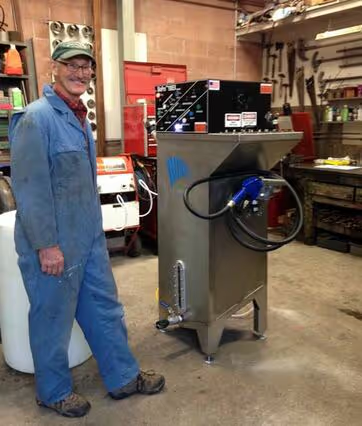

Henry Smith, board member of Farm Fuel Inc. stands with FFI's BioPro™ 190EX. Farm Fuel is small business located in Watsonville, CA that was started by organic farmers. They are currently converting mustard seed into biodiesel fuel and are looking to expand their operation with the purchase of four more mustard seed presses. Check out their Indigogo project.






.avif)
Dr. Ernst Cebert (left) and students from Alabama A&M's Department of Biological and Environmental Services have been working closely with the Toyota manufacturing plant of Huntsville, AL to make fuel from Toyota's cafeterias into ASTM grade biodiesel which is then used in plant vehicles. Toyota's North America 2013 Environmental report states:
The Huntsville plant delivers between 55 and 100 gallons per month of used cooking oil to Alabama A&M University, where the waste oil is converted to biodiesel using a Springboard Biodiesel BioProTM 190 unit. The unit is designed to produce ASTM-quality fuel, and is about the size of a stand-up arcade game."





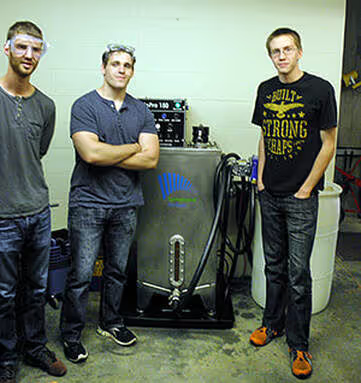

Students in professor Susan Newton's Bio-fuels and Biomass class at John Brown University in Sloam Springs, AR. stand with their trusty BioPro™ 150. The class description reads: "Three hours Introduction to power production from different biomass resources. Topics include: bio-energy sources (agricultural crops and organic wastes), combustion of solid biomass, production of gaseous and liquid fuels from biomass, environmental benefits and economic impacts of biomass conversion. A link to a more in depth description of their innovative program can be found here. A link to the JBU Renewable Energy Major is here. Susan writes, "It is now an Engineering concentration instead of a standalone major."





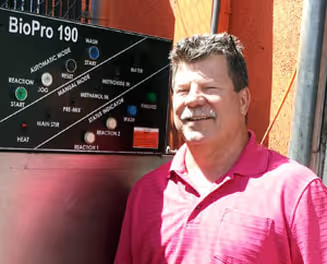

Brian Latta is the owner of 2 Chuy's restaurants in Tucson Arizona. Brian has owned a BioPro™ 190 since 2007. He produces over 100 gallons of fuel each month converting his WVO to fuel his 2006 Chevy Duramax 2500HD. Brian writes, "I covered the cost of the processor long ago and everything now is gravy on top of being Green! This is a great benefit to future expansion. I may need a bigger processor! Thanks to all the fine people at Springboard for all your help and advice through the years."





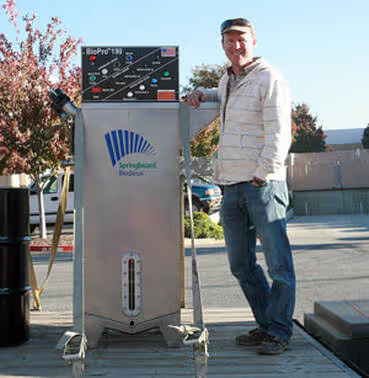

Local Farmer Greg Massa of Massa Farms just stepped up to the plate and stands here with his BioPro™ 190. Greg and his wife Raquel plan to press safflower seed to make biodiesel fuel for their farming equipment. Their plan includes selling the meal that is left over (after the oil is extruded) as cattle feed. They've taken a financially creative route to pay for the required equipment by putting up a crowd sourcing proposal. We applaud their initiative and urge anyone who can to contribute.







Paul Waxman, seen here with his family, his two diesel cars, and his BioPro 190, writes:"Closing in on our fourth year of biodiesel with the 190 - we only have biodiesel powered cars - a 2000 Jetta (~47 MPG) and 2005 Passat (~29 MPG) - and we go year round with B100... Our kids actually have not been to a gas station to fill up - they think a lot of people make their own biodiesel!!!...We live in a community where we test jets for the Navy – one of their bumper stickers is "Jet Noise: the sound of freedom". My bumper sticker: "Biodiesel: the smell of freedom"...Without the 190, I could have never made my own biodiesel due to the time constraints. With it, I smell freedom every morning when I start my car!"





.avif)

Rochester Institute of Technology professor David Fister loads up a BioPro™ 190 during a workshop presentation in October, 2012. David reports that the on-campus workshop was so well attended that we had people sitting in the aisles.





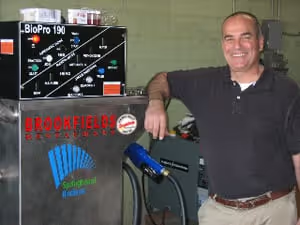

Sam Manolakas, owner of Brookfields Restaurants in Sacramento, says: "The BioPro 190 is a great machine and easy to use. We make 1 batch per week, based upon our diesel consumption, and use the Biodiesel in our 2006 sprinter delivery van. We filter the end product to 2 microns and have had no issues with the biodiesel in the 5 months of use. Our fuel costs for our company have gone from $1,000 per month to just over $300 per month. We will pay for the machine in less than 17 months, just in fuel savings. We are also promoting the “green” aspect of our Biodiesel manufacturing in our three restaurants and have received great customer comments."





.avif)

The Florida National Guard is producing biodiesel from used vegetable oil to fuel state maintenance vehicles at Camp Blanding Joint Training Center in Starke, Florida. Jessica Blersch (pictured) is the camp's Sustainability Coordinator. She operates the Camp's BioPro™ 190 and said in a recent interview that the camp makes biodiesel from their waste cooking oil for a total cost of $0.67 per gallon. "Not only are we converting the cooking oil into something useable – in this case the fuel – but we’re also hitting an alternative fuel goal as well,” said Blersch adding, “It’s something anyone can set up in the garage to make biodiesel with.”





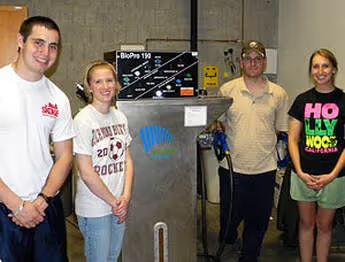

Illinois State University is one of 72 educational institutions that has discovered that it can collect waste cooking oils from its kitchens and cafeterias and convert that "yellow gold" into ASTM-grade biodiesel in a BioPro. Students from the Environmental Health Department stand with the campus BioPro™ 190 in an agricultural lab room on campus. ISU made a little less than 1,000 gallons of biodiesel in 2010 (their first year) and they hope to make more than 3,000 in 2011. So far, they use the fuel in a campus truck and several tractors.







Daphne Utilities in Daphne Alabama has established an award winning cooking grease recycling program with a BioPro 190. Each month, more than 400 gallons of used cooking oil are donated by residents of Daphne to their Municipal Utility company. Their recycling program allows the municipality to reduce costs on sewer maintenance and clean up (millions of dollars are spent nationally, every year, to clean up sewer spills associated with illegal kitchen oil disposal). Simultaneously, the recycled oils that aren’t going in to the town’s sewage system are being converted in to clean-burning fuel for the municipality’s trucks and heavy equipment. Daphne Utilities uses a single BioPro 190 to make this fuel and saves more than $10,000 per year doing it.
Daphne's Biodiesel Program





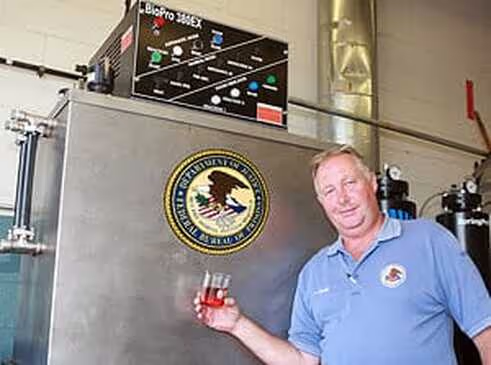

Tim Smith is the Fleet Manager at the Federal prison in Cumberland, MD. He stands with their BioPro 380EX and SpringPro T76 (behind him) holding a sample. Cumberland is one of three federal prisons that currently operate BioPro 380s. Tim and selected inmates operate the equipment. We visited Tim back in 2012 and trained him and five inmates on the ins and outs of making biodiesel.







Paul Totman of The Colusa Indian Community Council stands on site with his BioPro™380 and SpringPro™ T76. Paul and his colleague Scott Lunsford are in charge of making as much biodiesel as they can from a combination of reclaimed cooking oil (collected from the council's casino restaurants) and from safflower and sunflower crops the council grows on its sprawling 4,500 acres of farmland. "Just about every crop has some amount of oil in it" says Totman who points out that a vast amount of oil can be extruded from non-food grade crops. "One great source of oil for us now is sunflower screenings mixed with almond shells at a 90-10 blend," says Totman. Once the oil is extruded from these seeds it is converted to ASTM grade biodiesel in their BioPro™ and the remaining meal (a protein rich feed for livestock) can be sold for approximately $200/ton. Paul can make 200 gallons of ASTM grade biodiesel per day. He calculates that their total cost to make biodiesel, in chemical inputs, energy and labor is $1.50 per gallon! (And that's before tax credits for alternative energy equipment is factored in.) See front page story in California Farmer, January 2010.And more...







Mandi McKay operates the BioPro™ 190 for Sierra Nevada Brewery Co. In early 2008, Sierra Nevada took their recycling program one step further. They purchased a BioPro™ -"I love this machine," says Mandi- and began turning all used cooking oils from their Tap Room into biodiesel. They blend this biodiesel with regular diesel and use the mix to fuel their impressive fleet of short and long-range delivery trucks. ~Sierra Nevada's successful alternative energy program using a BioPro 190







Clay McInnis of SouthernEco LLC operates a BioPro 190 with an INCOSEP and a SpringPro T76, thereby enjoying a 10.5 hour processing time. "I absolutely love the machines and the setup wasn't as bad as I had thought… I am really excited about these processors. Thank you Springboard for all your support and excellent work.”





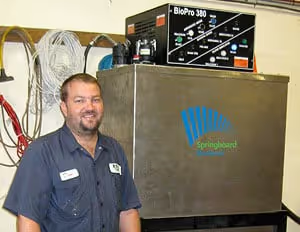

Fleet and Equipment Manager Richard Tolleson of Hawaii Reserves writes: "We work for a land management company. We manage 6,000 acres of farm land, commercial and residential properties, a shopping center, and much municipal infrastructure. I manage the fleet and equipment department; my worker Dan Clark (Pictured by the 380) is a Biochemistry grad who works wonders with the 380. In our 100+ batches, we’ve never lost one. We fuel backhoes, 5 different power-stroke F series Fords, a number of Kubota diesel mowers, forklifts, a mini-excavator, generators, pumps, and many other pieces of diesel equipment. We’ve developed a fine vac truck (we call it our Lipo-Sucker) and some great methodology for WVO collection. We also make about 1/3 of our batches from pork and chicken fats derived from large commercial kitchens nearby at the Polynesian Cultural Center and the Brigham Young University Hawaii Campus. We are located on Oahu’s windward side, about 30 miles North of Honolulu."







The Culinary Institute of America in St. Helena owns and operates a BioPro™ 190. Managing Director Charles Henning (right) and Director of Facilities Greg Phipps fill up a campus van with biodiesel pumped directly out of their machine. “For us it’s a no-brainer,” said Phipps who says they make biodiesel out of their recycled cooking oil for $0.88 cents/gallon. He added, “Plus the students learn about sustainability.”





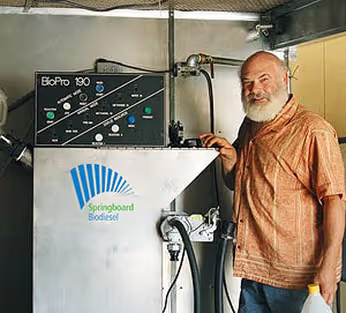

The New York Times once claimed that Dr. Andrew Weil, seen here with his BioPro™ 190, "has arguably become America's best known Doctor". Dr. Weil purchased his BioPro™ back in 2006. In an interview at his ranch in AZ., he gave a demonstration on how the machine operates and told reporters that there is "a pretty quick payback time on the cost of the unit." He added:"I really think this makes sense for a small co-op or any group of people... It's wonderful in many ways," explained the doctor, who points out that the fuel is renewable, cheaper and cleaner than regular automotive fuels, and fits his overall philosophy: the health of the planet "needs to be taken as seriously as individual health."





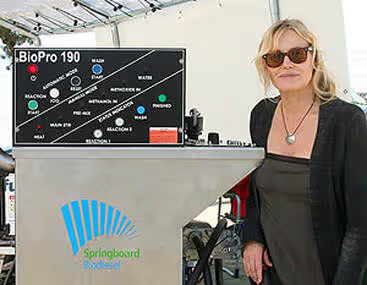

Actress and biodiesel advocate Daryl Hannah stopped by the Springboard Biodiesel exhibition tent at the World Ag Expo in Tulare, CA on February 9, 2011 and posed with her new BioPro™ 190. Ms. Hannah has joined the team and will be Springboard Biodiesel's latest dealer.





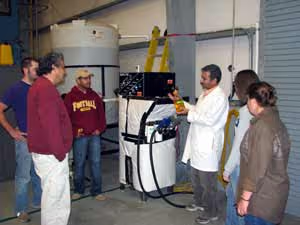

Louisiana State University operates a BioPro 190 in its Agricultural Research facility. Training in biodiesel production is offered to students and teachers alike and has also been given to farmers and interested members of the community; LSU produces biodiesel for research purposes. They also actively research alternative feedstock sources.





.avif)

The University of Wisconsin is one of 64 universities and colleges that currently owns and operates a BioPro as part of the regular curriculum. Students in The Agricultural Engineering Technology Department in River Falls operate the machine at a campus biodiesel processing facility.





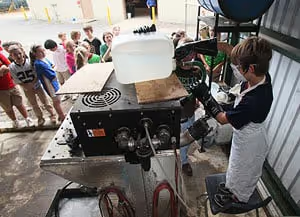

Operating a BioPro™ is so easy, even a 6th grader can do it. Sixth graders in Hammond, LA. participate in a demonstration of a BioPro™ on the campus of Southeast Louisiana State University.~The Biodiesel Program at Southeastern Louisiana State University





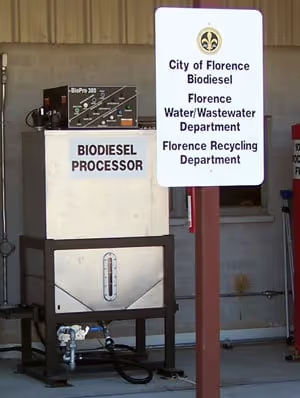

Michael Doyle, Manager City of Florence Gas & Water Wastewater Department write: "All the biodiesel we produce is blended and used in spreader trucks that land apply biosolids from the City of Florence, Alabama’s wastewater treatment plant. In addition, we have a waste oil collection program where our Recycling Department collects waste oil, curbside, from our residences. This program has been great for our city. We keep waste oil out of our sewer system which can cause clogs and overflows, and we use a recycled product to fuel vehicles that land apply a recycled product. It has been a “win win” situation for us!!"





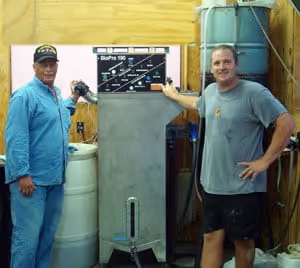

My father and I purchased a BioPro 190 as a joint venture and have been nothing but impressed. Not with just the processor, but the company as well. We were able to successfully process oil that titrated 15.5 and then have it pass the 3/27 test. For those of you looking for an automated processor that will do everything it claims backed by an extremely professional company, look no further."







"Of course, the excellent piece of equipment I purchased from you, the BioPro 190, has also lent to an increased level of comfort...Given my tight time constraints and very small working area it (the 190) was by far the best choice I could have made. I have my entire biodiesel production "shop" including WVO filtering, methanol supply, waste water drum, a "test bench" and BioPro 190 set up in a 7' x 8' shed. I was able to spend the last two days of summer vacation enjoying time with my kids while the BioPro 190 was busy converting my WVO into beautiful biodiesel!... I look forward to may years of cheap, clean , domestic, biodiesel!" I truly can not thank you enough. Thanks again."







Rodney started with a Fuelmeister and suffered set-backs before he purchased a BioPro 190. He writes: "I wish i had bought the bio pro 190 first. It would have saved me thousands of dollars and a lot of wasted time and fuel. I learned the hard way."





office
2323 Park Avenue
Chico, CA 95928
Support
Monday – Friday
10 a.m. - 6 p.m.












.svg)
